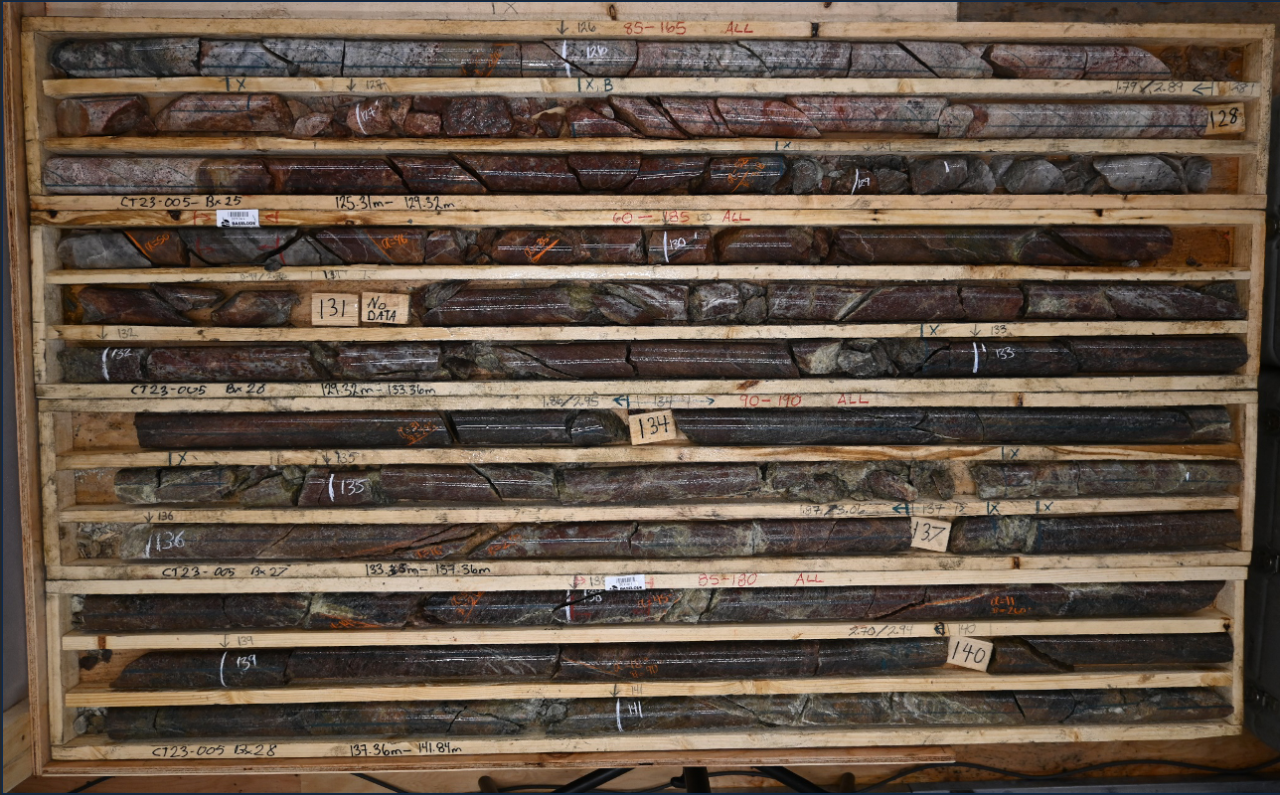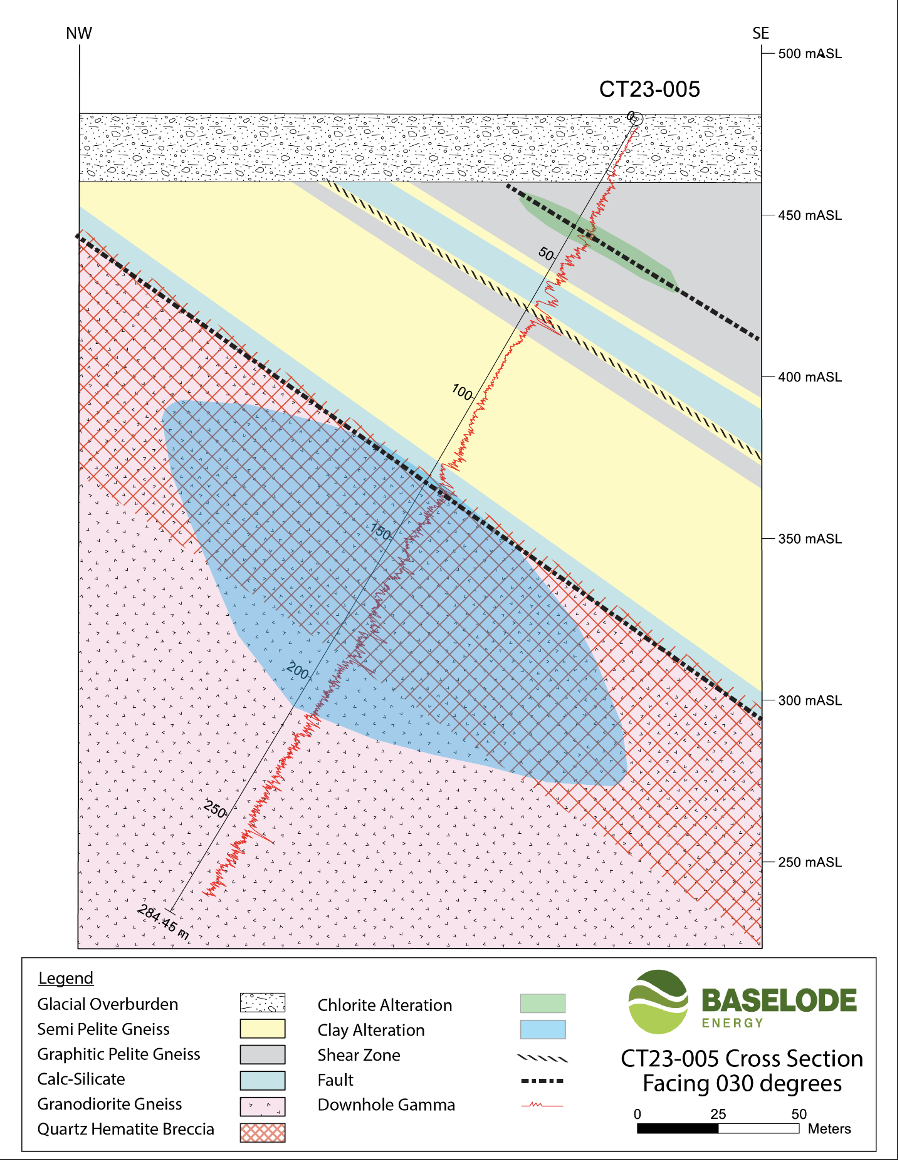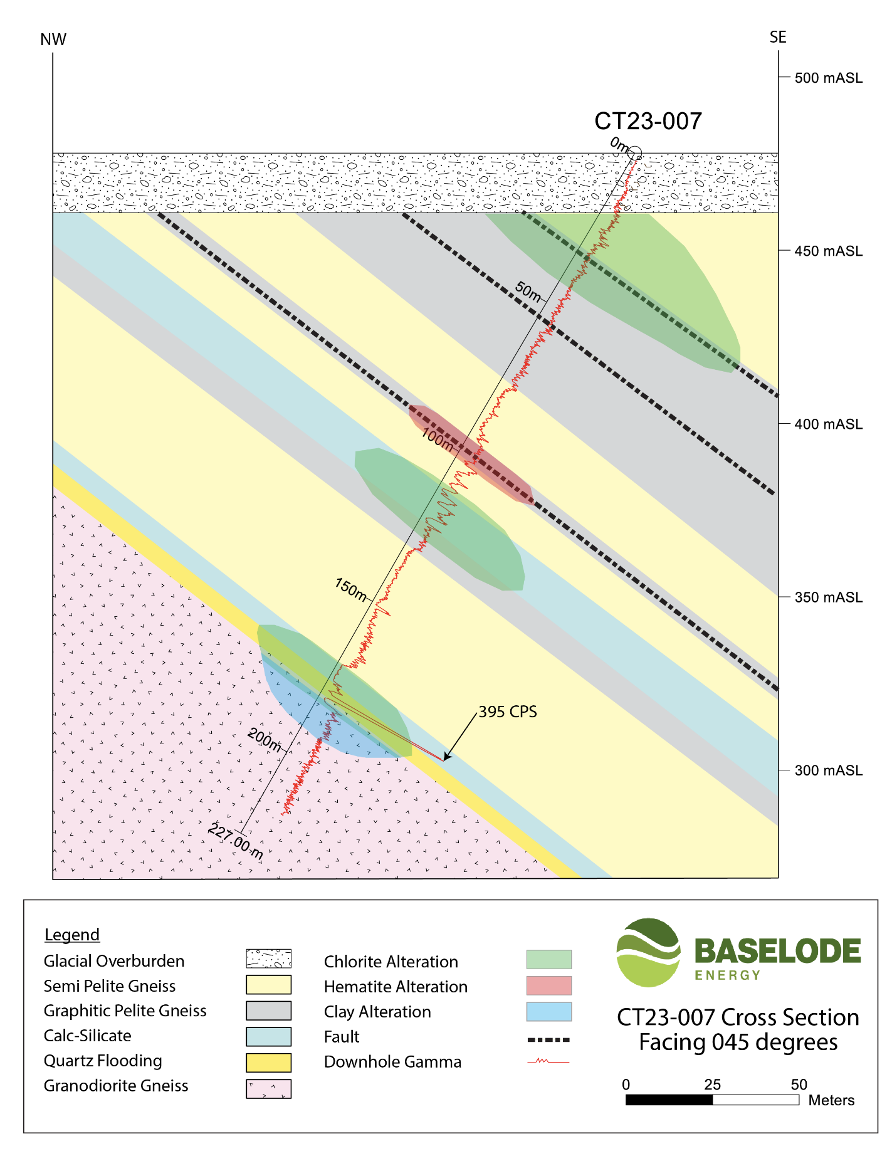News Releases
Baselode Identifies Elevated Radioactivity and Structural Alteration System at Catharsis Project, signs Exploration Agreement with English River First Nation
- Five of eight drill holes intersected elevated radioactivity at important lithological contacts
- CT23-005 intersected a 105 metre long hematite-quartz vein system with late clay alteration, CT23-008 intersected 17 metres of clay alteration, both alteration styles are similar to Athabasca uranium deposit fluid systems
Toronto, Ontario – February 27, 2023 – Baselode Energy Corp. (TSXV: FIND, OTCQB: BSENF) (“Baselode” or the “Company”) is pleased to announce the completion of eight drill holes for 1,630 metres on the Company’s first drill program (the “Program”) on the Catharsis project (“Catharsis” or the “Project”).
The first drill program on the Catharsis project has identified 1) a structurally-controlled quartz-hematite-clay alteration system over 105 m core length in hole CT23-005 that shares numerous similarities with fluid conduits observed near other Athabasca basement-hosted uranium deposits, 2) 17 metres of pervasive and intense clay, chlorite, and desillicification alteration styles, and 3) elevated radioactivity* near the lithological contact that separates the metasediments from orthogneiss in five of eight drill holes. Structures and fluids often propagate along this lithological contact in the formation of Athabasca uranium deposits. In CT23-005 and CT23-008 we see evidence of multiple structurally-controlled fluid events utilizing this contact.
“Although no elevated radioactivity was detected within the observed alteration systems, the presence of multiple generations of variable fluid compositions utilizing the same structural corridors is encouraging for continued exploration at this target and within the Catharsis project as a whole. Drill testing this target area has provided us good understanding of the geology and what our geophysical anomalies represent which has helped us identify and prioritize additional high-priority drill targets on the Catharsis project. As we wait for geochemical assay and study results from the Program, we’ll now turn our attention to our other exciting project, ACKIO, which hosts near-surface, high-grade uranium mineralization,” said James Sykes, CEO, President and Director of Baselode.
For more details on the Company’s drill results, watch this video:
Detailed Analysis of the First Drill Program on Catharsis
Drill Program Results
Baselode completed 1,630 metres in eight drill holes from seven collar locations on the Company’s first-ever drill program on the Catharsis project (see Figure 1 and Table 1). The drill holes targeted a combination of a gravity low coincident with EM conductors along a similar magnetic gradient. Approximately 2 km of over 100 kms of EM conductors on Catharsis have now been drill tested.
Drill holes CT23-001, CT23-003, CT23-004, CT23-006, and CT23-007 all intersected elevated radioactivity* at or near the lithological contact between the metasediments (i.e., pelites) and orthogneiss (i.e., granites, see Figure 4). Although not directly indicative of uranium deposits, elevated radioactivity is considered a geological feature of interest as a potential pathfinder for mobile uranium.
Drill hole CT23-005 intersected a 105 m long alteration system that includes multiple episodes of overlapping quartz veining/brecciation and hematite alteration which are both cut by later clay altered structures (see Figures 2 and 3). Quartz vein/breccia and hematite alteration structural associations have been observed as proximal fluid conduits to a few Athabasca basement-hosted uranium deposits, most notably NexGen Energy Ltd.’s (TSX:NXE) Arrow and Uranium Energy Corp.’s (NYSE:UEC) Raven-Horseshoe deposits.
Drill hole CT23-008 intersected a 17 m long pervasive chlorite, clay and desilicification zone with significant core loss above the lithological contact separating the metasediments and the orthogneiss. These combined alteration styles are consistent with both unconformity and basement-hosted uranium deposits. Although no elevated radioactivity was detected within either structural-alteration systems from CT23-005 and CT23-008, the evidence of multiple fluid flow events is encouraging for continued exploration on within the immediate drill targeted area.
A total of 138 drill core samples have been sent to Saskatchewan Research Council’s Geoanalytical Laboratory for multi-element geochemical analysis, sixty-one samples have been sent for clay speciation identification, and five samples from CT23-005 have been sent to Dr. Pan’s group at the University of Saskatchewan for quartz irradiation studies with a technique called electron paramagnetic resonance. The results will be released together after they’ve all been received, compiled, and interpreted by the Company.
Catharsis is located between 60 km and 100 km south of the Athabasca Basin margin, northern Saskatchewan.
*“elevated radioactivity”: greater than 2x to 5x the background radioactivity levels of all other rock types as measured with 2GHF Triple Gamma downhole probe
Exploration Agreement with English River First Nation
Baselode is pleased to announce a signed exploration agreement (the “Agreement”) with English River First Nation (“ERFN”) for consideration of exploration activities on the Catharsis project within ERFN’s traditional lands. The Agreement has established a mutually beneficial cooperation whereby Baselode and ERFN will continue to build a positive foundation to protect the rights and interests of ERFN, investing and supporting in ERFN’s community development, and protecting the environment for future generations.
The Company remains engaged in positive discussions with Indigenous communities and northern stakeholders for its exploration activities on Catharsis. Baselode is committed to mutually beneficial working relationships with Indigenous and northern communities while mitigating any exploration impacts on traditional Indigenous lands and Rights.
About Baselode Energy Corp.
Baselode controls 100% of approximately 250,480 hectares for exploration in the Athabasca Basin area, northern Saskatchewan, Canada. The land package is free of any option agreements or underlying royalties.
The Company discovered the ACKIO near-surface, high-grade uranium deposit in September 2021. ACKIO measures greater than 375 m along strike, greater than 150 m wide, comprised of at least 5 separate zones, with mineralization starting as shallow as 28 m beneath the surface and down to approximately 300 m depth beneath the surface with the bulk of mineralization occurring in the upper 200 m. ACKIO remains open to the west, south, and along the Athabasca sandstone unconformity to the east and south.
Baselode's Athabasca 2.0 exploration thesis focuses on discovering near-surface, basement-hosted, high-grade uranium orebodies outside the Athabasca Basin. The exploration thesis is further complemented by the Company's preferred use of innovative and well-understood geophysical methods to map deep structural controls to identify shallow targets for diamond drilling.
QP Statement
The technical information contained in this news release has been reviewed and approved by Cameron MacKay, P.Geo., Vice-President, Exploration & Development for Baselode Energy Corp., who is considered to be a Qualified Person as defined in “National Instrument 43-101, Standards of Disclosure for Mineral Projects.”
For further information, please contact:
Baselode Energy Corp.
FIND on the TSXV
James Sykes, CEO, President and Director
306-221-8717
Neither TSX Venture Exchange nor its Regulation Services Provider (as that term is defined in the TSX Venture Exchange policies) accepts responsibility for the adequacy or accuracy of this release.
Certain information in this press release may contain forward-looking statements. This information is based on current expectations that are subject to significant risks and uncertainties that are difficult to predict. Actual results might differ materially from results suggested in any forward-looking statements. Baselode Energy Corp. assumes no obligation to update the forward-looking statements, or to update the reasons why actual results could differ from those reflected in the forward looking-statements unless and until required by securities laws applicable to Baselode Energy Corp. Additional information identifying risks and uncertainties is contained in the Company's filings with Canadian securities regulators, which filings are available under Baselode Energy Corp. profile at www.sedar.com.
This news release does not constitute an offer to sell or a solicitation of an offer to buy any of the securities in the United States. The securities have not been and will not be registered under the United States Securities Act of 1933, as amended (the "U.S. Securities Act") or any state securities laws and may not be offered or sold within the United States or to, or for the account or benefit of, U.S. Persons unless registered under the U.S. Securities Act and applicable state securities laws, unless an exemption from such registration is available.
Table 1 – Drill hole collar details
|
DDH |
East |
North |
Elevation |
Azimuth |
Dip |
EOH |
|
||
|
CT23-001 |
412,154 |
6,256,688 |
481 |
306 |
-60 |
192 |
|
||
|
CT23-002 |
412,274 |
6,256,973 |
479 |
306 |
-60 |
186.4 |
|
||
|
CT23-003 |
412,078 |
6,257,604 |
480 |
315 |
-60 |
164 |
|
||
|
CT23-004 |
412,130 |
6,257,897 |
481 |
300 |
-60 |
158 |
|
||
|
CT23-005 |
412,181 |
6,258,132 |
480 |
300 |
-60 |
284.45 |
|
||
|
CT23-006 |
412,181 |
6,258,132 |
480 |
350 |
-60 |
233 |
|
||
|
CT23-007 |
412,247 |
6,258,107 |
478 |
300 |
-60 |
227 |
|
||
|
CT23-008 |
412,332 |
6,258,462 |
476 |
300 |
-60 |
185 |
|
||
|
8 DDH |
|
1,629.85 |
|
||||||
|
NOTES: East and North units are metres using NAD83 datum, UTM Zone 13N |
|||||||||
Figure 1: Drill Collar Location Map (magnetic tilt of the vertical derivative displayed as the background image)

Figure 2: CT23-005 (125.3 - 141.8 m); overlapping quartz, hematite and clay alteration

Figure 3: CT23-005 Cross Section

Figure 4: CT23-007 Cross Section, elevated radioactivity at lithological contact example


